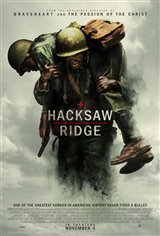It was an ugly, brutal scene in Okinawa, Japan, as guns fired, blood spilled and bodies dropped. Despite the carnage, a 26-year-old man repeatedly hurled himself into danger, running into harm's way to retrieve his fallen comrades and carry them to safety. Even more admirably, he was without a single weapon.
The battle described took place during World War II. The brave and heroic man who selflessly risked his own life for the lives of his countrymen was Desmond Thomas Doss, perhaps more commonly known as the first conscientious objector to win the United States' most prestigious military award, the Congressional Medal of Honor.
Doss was born in Lynchburg, Virginia on February 7, 1919. He was raised in a religious household and grew into a devoutly Christian man. He was a member of the Seventh-day Adventist Church and lived in strict accordance with the Ten Commandments, especially the sixth one, “Thou shalt not kill.”
When World War II broke out and he was drafted in April 1942 after working in a shipyard, he was granted conscientious objector status when he refused to bear arms as it was a violation of his religious principles. He was adamant that he would never take the life of a fellow human, and as a result, he became a medic. It was the only way he could adhere to the Sixth Commandment while still fulfilling his patriotic duties.
Doss was thrust into the heart of war in 1944 when he was sent to Guam with the 307th Infantry, 77th Infantry Division. He showed traces of heroism while on the Micronesian island when, for over several months, he braved the harsh elements and the ceaseless gunfire to rescue the wounded soldiers and bring them to safety. He did the same on the island of Leyte in the Philippines, and for his efforts, he earned the Bronze Star Medal.
But the events that would ultimately lead to his Congressional Medal of Honor unfolded on the Japanese island of Okinawa in 1945. On April 29, a heavy assault on American soldiers left approximately 75 seriously injured. The attack took place on a high summit and as detailed in a Washington Post article by Adam Bernstein following Doss's 2006 passing, Doss immediately leapt into action.
"Refusing cover, Mr. Doss carried each of the 75 casualties one-by-one to the edge of the cliff and helped lower them by rope to safety."
His brave behavior didn't end on April 29. As Bernstein reported, "He continued similar rescue missions over the following days, also tending to the wounded by administering plasma as mortar fire struck around him. During a nighttime attack [on] May 21 near Shuri, he received injuries from a grenade blast. Instead of risking the larger mission, he spent hours nursing his wounds. Seeing a soldier in worse condition nearby, he directed help to tend to that man first."
Doss voluntarily delayed his own treatment in the interest of helping a compatriot. While he waited for litter-bearers to reach him, he was attacked by a sniper. A bullet shattered his arm bone and to treat himself, he rigged up a rudimentary splint and crawled to an aid station without assistance.
When Doss returned to the U.S., he was presented with the Congressional Medal of Honor by President Harry Truman. As the official citation for his award indicates, "Through his outstanding bravery and unflinching determination in the face of desperately dangerous conditions, PFC (Private First Class) Doss saved the lives of many soldiers. His name became a symbol throughout the 77th Infantry Division for outstanding gallantry far above and beyond the call of duty."
Although he was healthy enough to accept his award in late 1945, a New York Times article by Richard Goldstein stated that Doss spent more than five years in hospitals for treatment from wounds endured overseas. He lost a lung on account of tuberculosis as well.
The same New York Times article, which was posted on March 26, 2006, also detailed the harassment Doss faced from his fellow soldiers for his devotion to prayer.
Doss, who later worked with young people in church-sponsored programs, died at the age of 87 on March 23, 2006, at his home in Piedmont, Alabama. He had a respiratory ailment, which was made reference to in Bernstein's article.
Goldstein's article also noted that Doss' wife Frances announced his death, and that he was survived by her, one son, three stepchildren, and several step grandchildren and step great-grandchildren.
His story was previously brought to the screen in the 2004 documentary Conscientious Objector, but will again be conveyed in the feature film Hacksaw Ridge. Mel Gibson directed the movie, which stars Andrew Garfield as Desmond. Co-stars include Hugo Weaving, Sam Worthington, Teresa Palmer, Vince Vaughn and Rachel Griffiths. The writer-director of Conscientious Objector, Terry Benedict, is on board as a producer.
~Matthew Pariselli
